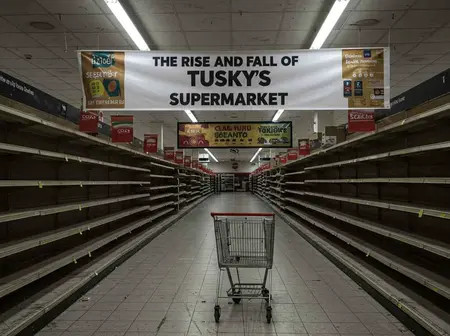When Tuskys Supermarket first opened in the late 1980s, shoppers buzzed with excitement. What began as a small mattress and discount grocery shop in Rongai soon captured the hearts of Nairobians and became a retail staple. At its peak, it stood tall among East Africa’s retail elite.
Tuskys began in the early 1980s as “Tusker Mattress” under Joram Kamau in Rongai, selling mattresses and household goods.
With support from Nakumatt’s founder, he expanded into grocery retail by the late 1980s, opening branches in Nairobi and parts of Nakuru.
After Kamau died in 2002, his children took over. Tuskys expanded dramatically, hitting 60–64 branches across Kenya and Uganda by around 2018–2020.
Plans for an IPO via Nairobi Securities Exchange’s Ibuka programme were in motion; Tuskys was riding high in the retail sector.
Between 2018 and early 2020, with competitors like Nakumatt collapsing, Tuskys appeared as Kenya’s next retail titan.
It diversified into hypermarkets and department store offerings, launched online delivery during the COVID‑19 panic rush, and sales peaked—even topping KSh 1.5 million a day at some locations in March 2020.
Beneath the surface, cracks began to show. After founder Joram’s death, his children—especially Samuel Kamau, Stephen Mukuha, Yusuf Mugweru, John Kago, and George Gachwe—became embroiled in bitter fights over control.
In 2012, Yusuf accused Stephen and George of siphoning KSh 1.64 billion, leading to court battles and even a physical altercation where Yusuf was slapped by Stephen in a public clash. Attempts at reconciliation failed, and corporate governance crumbled.
The 2012 allegations led to CID investigations. Court cases ensued over alleged embezzlement and fund diversion.
Regulators also stepped in: in 2013, Tuskys attempted a private takeover of Ukwala stores without regulatory approval, drawing a fine of about KSh 5.3 million and store closures by CAK.
By mid‑2020, supplier complaints, mounting bills to malls, unpaid staff, and power cut‑offs became commonplace.
From a high of 64 stores, by early 2023, only four or five remained. Tuskys was placed under liquidation; debts reached KSh 19.6 billion while recoverable assets were only about KSh 6 billion.
As of mid‑2025, the final outlets—such as the Imara branch—stood empty and dusty, near collapse
The story of Tuskys Supermarket is both inspiring and tragic—born from ambition and community, destroyed by internal discord and mismanagement. It serves as a powerful cautionary tale for family‑run businesses everywhere: legacy only survives with governance, unity, and strategy.

Leave a Reply